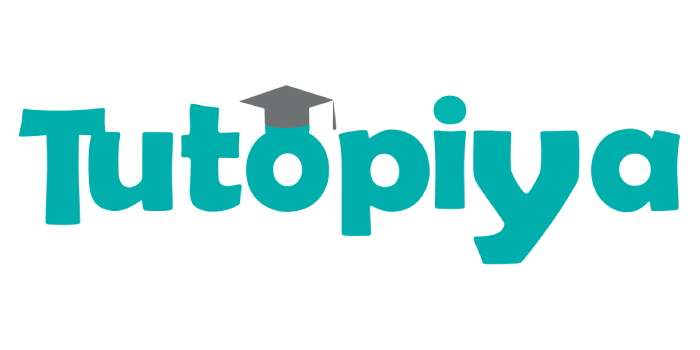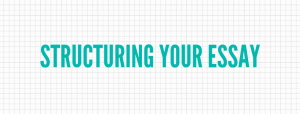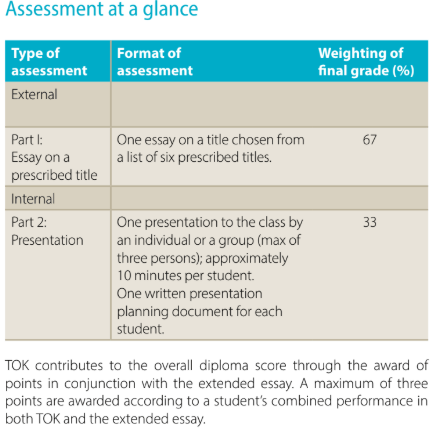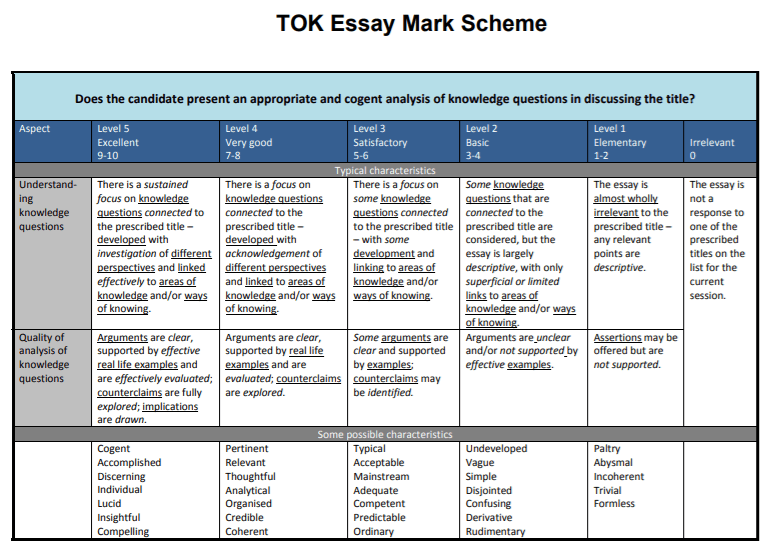How to Write an Effective IB Theory of Knowledge (TOK) Essay
- 2 month(s) ago

Writing a Theory of Knowledge (TOK) essay is a key part of the International Baccalaureate (IB) diploma, challenging students to engage their creative, analytical, and critical thinking skills. Given its importance in the IB curriculum, a well-crafted TOK essay can significantly impact your overall score. It’s essential to approach it with a clear understanding of the requirements and structure.
What is an IB TOK Essay?
A Theory of Knowledge (TOK) essay is a comparative discussion that explores significant questions by examining different areas of knowledge (AOKs). These essays encourage students to think critically about "why" and "what" questions concerning the world around them. Through this exploration, TOK essays help students develop a deeper understanding of how knowledge is constructed and challenged.
Structure of a Good IB TOK Essay
TOK essays typically range from 1,200 to 1,600 words, requiring clarity, depth, and careful organization. Below is a guide to the essential structure of a TOK essay:
1. Introduction
The introduction should be concise (about 100-150 words) and serve as an overview of the essay. Begin by presenting the prescribed title or question. Define key terms from the title and provide an outline of how the essay will address the question. A clear roadmap will guide the reader through your arguments and set the tone for the rest of the essay.
The body is where you delve into the core of the essay, focusing on two distinct Areas of Knowledge (AOKs). This section is typically divided into two main parts:
First AOK: Start with your first claim or argument related to the prescribed title. This claim should be backed by examples and explanations. Afterward, present a counterargument and provide evidence that supports the opposing viewpoint. Conclude by summarizing the overall argument for this AOK.
Second AOK: Follow a similar process for the second AOK. Present your claim, use relevant examples, and provide a counterargument. Again, conclude by synthesizing the points made within this section.
This balanced approach, incorporating arguments and counterarguments for both AOKs, demonstrates your ability to think critically and consider different perspectives.
3. Conclusion
In the conclusion, summarize the key insights from your discussion of the two AOKs. Reflect on the conclusions you've drawn, explaining their significance in relation to the prescribed title. Additionally, you can comment on the broader implications of your findings or suggest areas for further inquiry. A well-crafted conclusion ties everything together and leaves a lasting impression on the reader.
Tips for Writing a Strong IB TOK Essay
Writing a TOK essay can be more challenging than other essays due to the high level of creativity and critical thinking it requires. Here are some tips to help you excel:
The Four Cs
Content: Be well-versed in the different areas of knowledge. Ensure you have a strong understanding of the knowledge issues related to your chosen title.
Clarity : Organize your essay in a logical manner. A clear structure will make it easier for the reader to follow your argument and understand the connections between your claims and counterclaims.
Critical Thinking: Your arguments should not only be well-structured but also well-supported by evidence. Use examples and counterarguments to demonstrate the complexity of knowledge.
Creativity : Don’t be afraid to think outside the box. Applying original ideas to your analysis can make your essay more engaging and insightful.
Additional Tips
Choose an Engaging Title: Select a prescribed title that intrigues you, rather than simply opting for the easiest one. An engaging title will make the essay more interesting to write and read.
Focus on Two AOKs : Limit your discussion to two Areas of Knowledge, ensuring that you have enough space to explore them thoroughly.
Plan Thoroughly : Before writing, spend time outlining your arguments and identifying supporting examples. A clear plan will save time and help you stay focused.
Check the Assessment Criteria : Familiarize yourself with the TOK essay assessment rubric to understand how your essay will be evaluated.
Proofread and Edit : After writing, review your essay for clarity, coherence, and grammar. Editing ensures your essay is polished and free of errors.
The Importance of Critical Thinking in TOK Essays
TOK essays are designed to foster critical thinking by encouraging students to question assumptions, analyze knowledge claims, and consider different viewpoints. A successful TOK essay doesn’t just provide answers but demonstrates an understanding of the complexity of knowledge and the challenges of constructing and evaluating it.
Critical thinking in TOK essays requires balancing claims with counterclaims. The goal is to present a well-rounded view of the topic by exploring multiple perspectives. Back up each argument with concrete examples, and show how different interpretations can lead to different conclusions.
Writing a TOK essay can be demanding, but with careful planning and a structured approach, it can also be an enriching experience. By selecting a compelling title, focusing on critical analysis, and employing the four Cs—content, clarity, critical thinking, and creativity—you can craft a TOK essay that stands out.
Remember, the purpose of the TOK essay is not to provide definitive answers but to explore the nuances and complexities of knowledge. Embrace this challenge, and use it as an opportunity to deepen your understanding of how knowledge is constructed and communicated in the world around you.


Place a Quick Order
We have qualified Experts in all fields
Latest Articles
The Importance of Clear Objectives in Academic Research 1 month(s) ago
A Guide to Writing a Reflective Essay 1 month(s) ago
3 Common Outline Templates for Organizing Your Ideas 1 month(s) ago
How to Critique a Journal Article: A Comprehensive Guide 1 month(s) ago
Mastering the Art of Briefing Legal Cases: The FIRAC Method 1 month(s) ago
How to Write a Research Proposal 1 month(s) ago
How to Write a Strong Research Question: A Step-by-Step Guide 1 month(s) ago
10-Essay Writing Tips: A Step-by-Step Guide 1 month(s) ago
How to Write Captivating Product Descriptions that Boost Sales 2 month(s) ago
How to Write an Annotated Bibliography 2 month(s) ago

MidasNib is a leading proffesional writing service that offers a customized platform to connect private tutors to students. We have a team of professional academic expert tutors who provide on-demand academic help to our customers.
Need Proffesional academic writing service? Order Now

- [email protected]
- Get 21% OFF . Use the code: FIRST21

IB TOK Essay Rubric. Grading Criteria
As someone deeply immersed in the IB curriculum, I’ve encountered difficulty writing Theory of Knowledge (TOK) essays more times than I can count. Today, I’m here to tell you about the IB TOK essay rubric and grading criteria, offering insights I’ve gathered over the years. Trust me, understanding these elements can transform your TOK essay from good to exceptional.
What Is IB Theory of Knowledge Essay?
The International Baccalaureate TOK essay is a critical element of the IB Diploma Programme that pushes students to ponder the nature and acquisition of knowledge. This task requires students to examine and articulate their understanding of how we come to know what we claim to know, engaging them in a deep reflection on knowledge itself, its sources, and its application in various contexts.
This essay is a philosophical research that encourages critical thinking and analysis across different areas of knowledge, including ethics, science, mathematics, and the arts. At the heart of the IB TOK essay are several key components that students must know:
- The essay prompts students to reflect on the nature of knowledge and how we come to know what we claim to know. It is an exercise in critical thinking and philosophy, where students examine the bases of knowledge and how it intersects with the world around them.
- Students choose from a list of prescribed titles the IB organization releases annually. These titles prompt discussions on various topics in knowledge, ethics, science, mathematics, human sciences, and more.
- There is a maximum TOK essay word count of 1,600 words. This strict limit requires students to articulate their thoughts clearly and concisely.
- The essay is assessed using criteria that evaluate students’ ability to identify and research knowledge issues, contrast TOK key concepts , demonstrate critical thinking, and organize their ideas coherently.
- Students are encouraged to start early, select a topic that interests them, and engage in extensive research and critical thinking. Collaboration with TOK teachers for guidance and feedback throughout the writing process is also crucial.
- Through the TOK essay, students develop skills in critical thinking, analysis, synthesis of information from various disciplines, and the ability to argue coherently and persuasively.
The TOK essay and the TOK exhibition contribute up to three points towards the total score of the IB Diploma. The performance in TOK is combined with the Extended Essay (EE) to determine the number of additional points awarded.
You Might Also Like:
- November 2024 TOK Essay Titles
- TOK Exhibition Word Count
- TOK Essay Word Count
- How to Write TOK Essay in One Week
- IB TOK Essay Structure in Detail
- AOKs in IB TOK
- 12 TOK Key Concepts with Examples
- The Human Sciences AOK in TOK
- The Natural Sciences AOK and Its Significance in TOK
IB Theory of Knowledge Essay Rubric
As an IB writer and mentor, I’ve seen these guidelines as a checklist and a map for writing insightful, coherent works in the IB Theory of Knowledge . My goal here is to explain these criteria.

Addressing the Knowledge Question (0-2 points)
A central component of the TOK essay is its focus on a knowledge question directly related to the chosen title. This question must be explicitly identified early in the essay as a foundation for your analysis and arguments. The clarity with which you state this question and the extent to which it informs the development of your essay is crucial for scoring in this category.
Grasping Knowledge Issues (0-2 points)
Your essay must profoundly comprehend the knowledge issues connected to your central knowledge question. It includes recognizing the diverse methods through which knowledge is obtained and acknowledging the potential limitations and biases influencing our perception of the world. A high score in this area reflects your ability to dig into these complexities and present them thoughtfully within your essay.
Critical Analysis and Evaluation (0-2 points)
A critical dissection and assessment of the knowledge question are imperative in your TOK essay. It involves using relevant examples and evidence to bolster your arguments alongside a meticulous examination of the various approaches to knowledge, highlighting their strengths and pitfalls. Additionally, it includes appraising the comparative worth of these different approaches and showcasing your ability to engage with the question at hand critically.
Incorporating AOKs and WOKs (0-2 points)
our essay must showcase an adept understanding of the multifaceted nature in which knowledge is acquired, highlighting the roles of empirical evidence, logical deduction, and personal experiences. Equally important is demonstrating a thorough grasp of the various Ways of Knowing (WOKs) — including reason, emotion, perception, and language — and articulating how these intersect and interact with the central knowledge question. A high score in this criterion indicates a comprehensive integration and consideration of AOKs and WOKs in your analysis.
Demonstrating Personal Engagement (0-2 points)
Your TOK essay should vividly reflect your connection and engagement with the knowledge question. It should show your awareness of how the arguments presented resonate with your experiences and perceptions and their broader implications for the world you inhabit. Achieving high marks in this area means successfully conveying how researching the knowledge question has influenced your understanding and perspective, integrating personal insight with academic analysis.
Coherence and Structure (0-2 points)
A well-written TOK essay is characterized by its organization and clarity, featuring a distinct introduction, body, and conclusion. The arrangement should be logical and enhance the essay’s central argument, ensuring a seamless flow of ideas from start to finish. High scores in this domain are awarded to essays demonstrating meticulous planning and an ability to guide the reader.
Clarity in Presentation (0-2 points)
Your TOK essay should be articulated clearly, concisely, and well-structured, paying close attention to the accuracy of grammar, spelling, and punctuation. It is also essential to adhere to the proper referencing and citation style throughout the document. Essays that score well in this category prioritize readability and scholarly integrity, making it easy for the reader to follow and appreciate the depth of the analysis. So, follow the IB TOK essay structure in detail.
Innovative Approach and Creativity (0-2 points)
Your TOK essay should exhibit originality and inventiveness in addressing the knowledge question and selecting examples and evidence to bolster your arguments. High-scoring essays in this category are characterized by their creative insights and the ability to think outside the box, demonstrating a proactive approach to elucidating the knowledge question.
Get Help With Your Paper
Ib tok essay grading criteria explained.
The grading criteria for the TOK essay follow a holistic approach, considering all aspects of the rubric. Essays are marked on a scale, with each level reflecting a range of performance in the criteria mentioned above. Here are some insights:
- Excellent Performance . Essays in this category exhibit a deep understanding of knowledge issues, sophisticated analysis, and clear, coherent organization. They effectively incorporate multiple perspectives and are enriched with well-integrated examples.
- Good Performance . These essays demonstrate a good understanding and analysis of knowledge issues, though they may lack the depth or coherence of the top-tier essays. The organization is solid, and examples are used effectively, though perhaps with less sophistication.
- Satisfactory Performance . Here, essays adequately understand the knowledge issues but may struggle with in-depth analysis or coherent organization. Using examples and considering different perspectives is present but not fully developed.
- Basic Performance . Essays in this range have a basic grasp of the knowledge issues but significant weaknesses in analysis, organization, and examples. They may overlook essential perspectives or implications.
From my experience, the key to excelling under these grading criteria lies in understanding what each criterion asks for and integrating these elements into a cohesive, compelling narrative. Crafting your essay with an awareness of these grading nuances can elevate your work from satisfactory to exceptional.
Passing Grade for the Theory of Knowledge Essay
The TOK essay and the TOK presentation form part of the core of the IB Diploma Programme, and students must pass both components to receive their diploma. The TOK essay and presentation are graded on a letter scale of A (excellent) to E (elementary), with D considered a passing grade. However, it’s important to remember that the final TOK grade is combined with the Extended Essay grade, which can significantly impact your overall diploma points.
You generally need to avoid receiving an E grade to pass the TOK component. The combined points for TOK and the EE can contribute up to 3 bonus points towards your diploma, depending on their combined quality. Scores are determined by a matrix that the IB updates periodically, so aiming for the highest possible grades in TOK and EE is crucial to maximizing your diploma points.
Remember, the specific criteria for passing can vary slightly with changes to the IB curriculum and assessment guides, so it’s always a good idea to consult the latest materials or speak with your TOK teacher for the most current information.
In summary, passing the TOK essay requires a comprehensive understanding of the knowledge issues, a critical and reflective approach to the essay question, and a commitment to articulate your thoughts clearly and coherently.
So, mastering the IB TOK essay rubric and grading criteria is a worthwhile path. It’s not just about securing high marks; it’s about developing a nuanced understanding of knowledge. As you prepare to tackle your TOK essay, carry with you the insights and strategies shared.
So, start early, seek feedback, and let your understanding of the rubric infuse every paragraph of your essay. With the right approach, the TOK essay expands your horizons of learning. Good luck, and remember, our experts are always by your side and can help you with the TOK essay .

Valerie Green
Valerie Green is a dedicated educator who spends her time helping high school and college students succeed. She writes articles and guides for various online education projects, providing students with the tools they need to excel in their studies. Friendly and approachable, she is committed to making a difference in the lives of students.

The Role of TOK in Interdisciplinary Understanding
TOK encourages students to look into how different types of information connect and combine, which leads to a more all-around way of learning. TOK acts as a link between subjects that might otherwise seem unconnected, such as relating mathematical ideas to natural patterns or examining the moral ramifications of science developments.

How to Conduct Effective Peer Reviews in IB Projects?
Peer review in IB projects is a vital skill that can greatly improve the quality of your projects and your academic growth. From what I’ve seen, peer reviews are a great way to get helpful feedback, see things from different angles, and make your work better.

Utilizing Digital Tools for IB Study and Research
Now that we live in a digital world, using technology to its fullest can greatly improve your IB study and research. Staying prepared, controlling time, and conducting research have never been simpler thanks to the abundance of apps and platforms available. The important thing is to know which tools will help you reach your school goals.

How to Balance Extracurricular Activities and IB Studies?
Balancing extracurricular activities and IB studies can feel like walking a tightrope, but with the right strategies, it’s entirely possible to manage both effectively. In fact, many IB students successfully juggle academic demands with sports, clubs, and hobbies. The key lies in prioritization, time management, and staying organized.

What Is the IB Learner Profile? Attributes and Benefits
It’s more than just a framework; the IB learner profile is a list of ten traits that are meant to help students become well-rounded, globally aware people. As an IB writer, I can say that these characteristics, like thinking, communicating, and keeping an open mind, help students grow mentally and socially.

How to Write a Successful IB TOK Exhibition?
To make a successful TOK exhibition, carefully choose the objects, provide clear comments, and plan. As a teacher of IB writing for many years, I’ve seen that students who approach the task with an organized plan and a lot of thought often come up with the best presentations. Don’t rush through the process.
© 2024 I Bstudenthelp.com. This website is owned and operated by Udeepi OU Harju maakond, Tallinn, Lasnamäe linnaosa, Sepapaja tn 6, 15551. Disclaimer : Services we provide are only to assist the buyer like a guideline to complete any kind of writing assignment. Privacy Policy Terms and Conditions Cookie Policy Revision Policy Refund Policy

How to Write A TOK Essay: 3 Key Parts

After understanding the of the basics of the essay, your next step is to grasp how it is evaluated and marked, which is outlined in the ‘assessment instrument’. Your TOK teacher will give you a copy of this, or you can find it online in the 2022 TOK Guide.
The overall assessment objective of the TOK essay is to answer the prescribed essay title in a clear, coherent, and critical way. In order to do this, the assessment ‘instrument’ looks for five different skills.
STEP 1: Understand the TOK essay rubric
1. making links to tok.
The discussion within your TOK essay should be linked very effectively to the areas of knowledge . Most, TOK essays expect you to discuss two AOKs, which will provide you with the context to explore and answer the prescribed title you’ve chosen.
2. Understanding perspectives
Your TOK essay should show a clear awareness of different points of view, and should offer an evaluation of them. This means considering how different perspective might approach the question in different ways.
3. Offering an effective argument
The arguments within your TOK essay are clear and coherent, and are supported by strong examples.
This means expressing your opinions clearly, and supporting them with original and meaningful real-life situations.
4. Keeping discussions relevant
Your essay’s discussions should offer a ‘sustained focus’ on the title. This means that you should be able to pick out any section of your essay, and be able to identify what question it is answering.
5. Considering implications
Your essay needs to not just present and evaluate arguments, it also needs to say why these arguments are significant, and what their implications are.
After you have grasped the rubric strands, you are ready to move on to choosing your prescribed title from the choice of six that are published in March or November – which we provide guidance on here .
Creating a TOK essay: our four-step guide
Click on the buttons below to take you to the four steps of creating a great TOK essay. Don’t forget that we have plenty of videos on this and other aspects of the course, and members of the site have access to a huge amount of other resources to help you master the course and assessment tasks.

How to write a TOK essay: webinar
This 80-minute webinar video and presentation gives you a clear, engaging, step-by-step guide to the task, helping you to understand the assessment rubric, choose the right PT, and produce an essay that hits all the assessment targets.
The video is supported by a presentation, and a Q&A debrief answering some of the most common questions asked about writing a TOK essay. Purchase your ticket here .
More support for the TOK essay
Make sure that your TOK teacher has given you access to all the documents and online material that support the essay. These include the TOK Subject Guide, the TOK essay rubric, and exemplar TOK essays (found in ‘MyIB’, which is accessible to teachers). Make sure you go through our other pages on writing the TOK essay. You’ll find help on understanding what the is looking for, that works for you, what each of the should focus on, how to an effective TOK essay, and how to fill in your . If your school is a member of theoryofknowledge.net, we have designed a series of lessons on the essay, with two formative assessment tasks. These will familiarize you with the essay rubric, knowledge questions, real-life situations, how to deal with perspectives and implications, and structuring an essay. If you are signed into the site, you can access these lessons here . You can also find out our thoughts on the TOK essay (and the TOK exhibition) in several webinars that we have delivered. The main one is the TOK Assessment 2022 webinar, but we also consider this form of assessment in our free webinars on the 2022 course. You can see these webinars on this page of the site.

Subscribe to the free TOK newsletter!
Subscribe to our free newsletter, and collect fantastic examples that will help you to understand the key ideas of TOK, support your essay and exhibition discussions, and help you to become an authentic critical thinker .
You’ll encounter some of the most important thinkers from the past and the present, go beyond the headlines of contemporary events and issues around the globe, and see how TOK concepts manifest in the real-world. Subscribe HERE !

- Blog , IBDP , Learning Tips
How To Write a ToK Essay IBDP – Step-By-Step Guide
- October 3, 2019
- 10 minutes read
- Listen to this
- Learn how to write a IB ToK Essay with our step-by-step guide. The guide helps you with the ToK Essay Structure as well as a ToK Essay Analysis Example.
Let’s learn how to write a ToK Essay with Tutopiya. The IB ToK Essay contributes to the overall score of a student’s IB Diploma. The award of points for the IB ToK Essay is in conjunction with the extended essay. A maximum of three points is awarded according to a student’s combined performance in both the TOK and Extended Essay.
Tutopiya will help and guide our IB Diploma students on the following:
- How to Start a ToK Essay
- Cover the ToK Essay Structure
- How to Write a ToK Essay Conclusion
- Analysis of a ToK Essay Example

Choosing Your Essay Title
Before you can dive into structuring or writing your essay, you will need to spend time to decide on a topic you wish to write on. For the IB ToK Essay, you are required to compare and contrast different ways of knowing through perception, language, reason, emotion with different areas of knowledge (AOK).
1 – Selecting your prescribed title and knowledge question
Before you hastily decide on a title you wish to write, take some time to read each title carefully on the list and brainstorm ideas.
Tip #1: Brainstorming
Get some initial ideas you have of each and every title/ question down on paper. Ask yourself some simple questions when brainstorming for each title.
Am I confident to write an essay about this? Is the question asking what I am thinking? Do I understand the keywords or concepts in the title?
You may not be clear on what the title is asking you to do. Go through the title and highlight any keywords and concepts you are unsure about or may have missed out.
Do you have a strong interest in the title? We recommend that you should at least be interested since you will be spending time and effort on researching this topic, pick something you are willing to research more about!
Can you relate anything to the title? Though the IB Tok Essay should be as objective as possible, you can always inject the essay with personality and character.
You can always do so by adding in ideas or topics you have learned or studied in class or even personal experiences.
Tip #2: Understanding the question in your own words
The titles of these essay questions can sometimes be long and difficult to grasp when you first read them so before you write the IB ToK Essay, consider paraphrasing the question in your own words.
You may struggle to understand the keywords and concepts in the title, you may even be unsure about the perspective, comparison and contrast of the title.
To help our IB students, we recommend breaking down the question/ title by first, understanding the keywords in the title. Then, put the title together and understand what they are asking.
This way, you will be able to understand the title more in-depth than before and able to answer the title sufficiently.

Structuring your Essay
1 – knowing the assessment criteria .
Overall Assessment

2 – Theory of Knowledge Essay

The rubrics require students to be able to understand the knowledge questions and their quality of analysis of knowledge questions. View the TOK Essay Mark Scheme here .
You will have to choose two Areas of Knowledge (AOK) to explore.
There are 8 different Areas of Knowledge are as follows:
- Mathematics
- Natural Sciences
- Humane Sciences
- Religious knowledge systems
- Indigenous knowledge systems
You can also use Ways of Knowledge (WOK) in your essay and the are as follows:
- Sense Perception
- Imagination

Analysis of a Sample Essay
Question: “Doubt is the key to knowledge (Persian Proverb). To what extent is this true in two areas of knowledge?
Important Keywords in the Title
“To what extent”
When keywords like this appear, note that you need to present 2 different perspectives to the question, a for and against argument in your essay.

Paragraph 1: Introduction
You would provide an explanation and interpretation of the title and identify the key terms in the title. You would also need to state your thesis and explain or identify the areas of knowledge you will be exploring in your essay.
1 – Start the essay by saying something relatable or interesting
By doing that, you can capture the reader’s attention and make them want to read more by evoking a sense of curiosity to find out more about your essay.
2 – Your Thesis/ Stand
You can also state your thesis (that is different from mainstream ideas – to capture the reader’s attention). You can make the decision to be a for or against stand in your essay. If you decided

In your own words , give an interpretation of the title and show that you are able to identify the key terms of the question.
“The problem with doubt as the key to knowledge is that doubt isn’t a way of knowing. Doubt is an emotion we feel that motivates us to seek knowledge.”
3 – Outline of the paragraph
Give the readers an idea of what you will be going through in your body paragraphs , a sentence that gives the readers a preview. Let the readers know which AOKs you will be exploring, making it easier for the examiner to know what to look for.
“However this motivation can manifest itself differently in contrasting areas of knowledge like Mathematics and Religion.”
Your introduction should not be too long, use around 150 to 200 words for your first paragraph would be sufficient.

Paragraph 2: First Area of Knowledge.
1 – begin your paragraph with a claim or topic sentence.
This helps you to outline your argument about the title.
“Mathematics is an area of knowledge that is only concerned with reason.”
2 – Explain and Elaborate
Now, give explain and elaborate on your topic sentence/ claim.
“In a right-angled triangle a²+b²=c² and that’s it. There are no alternative answers or personal interpretations. An answer to a mathematical problem is either right or wrong. This is because the main way of knowing in math is reason and evidence is required for a mathematical statement to be true or false.”
3 – Give an example with an explanation
This helps you to further elaborate and explore your topic sentence or claim.
The example you give should be personal, specific, precise and real.
This way you can make your claim believable and relatable in some sense. This also helps to evoke a sense of authenticity in your essay.
“When we first learned about negative numbers in math class it made no sense to me. How could a bigger number have a lower value than a smaller one? It was illogical and it contradicted all the math I had learned before that day….. Either the previous mathematical information was wrong or the new information about negative numbers were wrong. But he explained the concept of a number line with a central point 0 and that they were both right.”
4 – Linking back
Remember to link back to your claim and the question after you are done exploring this example.
“My doubt led to understanding and was the key to my knowledge.”

Paragraph 3: Counter
1 – state your counterclaim.
This paragraph would focus on counterclaim . You are supposed to discuss 2 different perspectives to your claim, a for and against. You are to argue against your claim above this paragraph.
“On the other hand, doubt in mathematics can be detrimental to education.”
2 – Give an Example and Explanation
Add in an example and explanation to support your counterclaim.
“For example, after I do a question from the International Baccalaureate mathematics textbook I always look at the back in order to check if my answers are correct because it has answers in the back. If I do not have the book and I am in class then I ask my mathematics teacher for the correct answer. I do this when I am uncertain of my answer to a question and my doubt allows me to gain knowledge i.e. whether my answer is wrong or right. My doubt also helps me to assess how much of the mathematical concept I have understood by marking myself. However, this can be detrimental to progress because I started to become dependent on the answers at the back of the book or my mathematics teacher. Every time I do a question I feel like I have to verify my answer with an authoritative source which I have now come to understand leaves no room for exploration or the development of my own methods.”

3 – Linking back
Link back to your prescribed title and your claim of this paragraph.
“My doubt caused a loss of confidence in my mathematical abilities and dependence on authoritative sources.”
Now, follow this format and carry on writing for the next two body paragraphs, exploring on another Area of Knowledge, in this case, this student will have to write one more AOK on Religion and a counterclaim for it.
Aim to write a maximum of 600 words for each Area of Knowledge (Paragraph 2 and 3, Paragraph 4 and 5).
Paragraph 4: Second Area of Knowledge
- Topic Sentence
- Example + Explanation
Paragraph 5: Counterclaim
- Topic Sentence (Counterclaim)
- Example + Explanation
- Link to prescribed title and your initial claim of this Area of Knowledge
Finally, write your ToK Essay conclusion in one paragraph totalling 200 to 250 words .

Paragraph 6: Your conclusion
Explain the different insights you have gained or have come out of this essay.
“As illustrated by the example of dependence on authoritative sources in mathematics doubt can be detrimental and cause a loss of confidence. Similarly, doubting conjectures has also proven to be unfruitful. However, within mathematics individual doubt can lead to the acquisition of knowledge.”
Implications and significance
Tell the readers why it is important to know that and how does it matter that they understand this when you write your IB ToK Essay.
Perspectives and Extension
If you can, try to input a very different perspective on your conclusion. Perhaps recognizing a different way of approaching the question, which could have resulted in different insights.
You can mention the limitations of your essay saying there are one or two unresolved questions that this essay has revealed. It’s about showing the readers that the conversation is not over yet. And that, there is more to the question and more rooms that you can explore.
“Furthermore, in areas like religion where we do not yet have the tools to prove it one way or the other simply doubting something by itself is a step towards acquiring knowledge because by suggesting that certain view is not absolute it makes room for new knowledge.”

A Quick Tip for writing a ToK Essay
Tip: try not to use dictionary definitions in your essay.
You want to show the examiners that you are writing a reflective essay, not a textbook definition heavy essay. Don’t rely too much on dictionary definitions to prove your argument or support a counterclaim. This will demonstrate that you did not engage with the topic and bypassed complexities around the topic.
Instead of using standard answers or cliche examples, you can try to use your own personal experiences to make it original and insightful for your readers. Though the essay should be objective, your essay should still have a personality and character.
Try Getting Expert’s Help
Tutopiya is a 1-1 Live Online Tutoring for all students aged 8 to 18 years old. Tutopiya offers the IB Diploma Program curriculum to all students, visit our IB curriculum page to find out more about the subjects we teach here. We also have a blog full of useful IB resources for our students, why not read another sample essay for IB TOK ?
Interested to try our online learning with our expert IB tutors? We provide FREE 60 minutes trial lesson to all new students. You can sign up or simply fill up a trial form application here to begin learning with Tutopiya! Come learn how to write a ToK essay with Tutopiya today!

I am currently a full-time student studying at a local university in Singapore while freelancing as a writer. I enjoy writing and sharing useful education-related tips with my fellow studying peers. During my leisure time, I enjoy doing creative arts and volunteering work. I am passionate about sharing my experience as a student! ☺
See author's posts
Learn Anything, On Your Schedule
Designed for self-paced study, practice and revision
- Curated Study Resources
- 50000+ Practice Papers
- AI Exam Coach
- 200+ Topic Specific Videos
Join our community of 10,000+ students
Learn from the best teachers, an interactive learning platform, and a large library of engaging video sessions.
22 Changi Business Park Central 2, #02-08, Singapore, 486032,
All rights reserved ©2024 Tutopiya
Get Started
Learner guide
Tutor guide
IGCSE Tuition
IGCSE Revision & Exam Preparation
IB Revision & Exam Preparation
International AS & A-level Tuition
International AS & A-level Revision & Exam Preparation
Cambridge Lower Secondary Tuition
Cambridge Checkpoint Revision & Exam Preparation
Cambridge IGCSE Tuition
Edexcel IGCSE Tuition
Subjects & Curricula
IGCSE Maths Tuition
IGCSE Additional Math Tuition
IGCSE English Tuition
IGCSE English Literature Tuition
IGCSE Combined/Coordinated Science Tuition
IGCSE Physics Tuition
IGCSE Chemistry Tuition
IGCSE Biology Tuition
IGCSE Economics Tuition
IGCSE Business Studies Tuition
IGCSE Computer Science Tuition
A-level Maths Tuition
A-level Physics Tuition
A-level Biology Tuition
A-level Chemistry Tuition
A-level Economics Tuition
IB DP Maths Tuition
IB DP Physics Tuition
IB DP Chemistry Tuition
IB DP Biology Tuition
IB MYP Maths Tuition
IB MYP Science Tuition
IB MYP English Tuition
Cambridge Lower Secondary Maths Tuition
Cambridge Lower Secondary English Tuition
Cambridge Lower Secondary Science Tuition
Cambridge Primary Maths Tuition
Cambridge Primary English Tuition
Cambridge Primary Science Tuition
Privacy policy
Terms & Conditions
IGCSE Maths Resources
IGCSE English Language Resources
IGCSE English Literature Resources
IGCSE Physics Resources
IGCSE Chemistry Resources
IGCSE Biology Resources
IGCSE Economics Resources
IGCSE Business Studies Resources
IGCSE Computer Science Resources
IGCSE Additional Maths Resources
A-level Maths Resources
A-level Chemistry Resources
A-level Biology Resources
IB DP Maths Resources
IB DP Chemistry Resources
IB DP Biology Resources
Cambridge Lower Secondary Math Resources
Cambridge Lower Secondary English Resources
Cambridge Lower Secondary Science Resources
Fill out the form below and you will get webinar session's link by email.
Fill out the form below and we will email you the webinar video..
How To Write A ToK Essay - Updated 2023
Ace your ToK Essay with our expert tips & tricks! Get the latest and greatest techniques on "How To Write A ToK Essay" and impress the IB examiners.📝💡

Table of content
- Introduction
Purpose Of ToK
Assessment of tok, the game plan, execution of the gameplan, planning for tok essay, structure of tok essay, conclusions, bibliography.
Introduce your topic accurately and state your thesis statement for the essay carefully. A thesis statement is like a teaser to your entire essay wherein you define your key terms and introduce your interpretation of the question. Make sure that you do not reword the prescribed title in your thesis. Instead, it needs to, as the word says, INTRODUCE your readers to what your essay is about. A strong introduction allows the reader to deduce what knowledge question(s) you are trying to answer.
So, in a nutshell
- Write interesting things about the given TOK essay title .
- Define key terms
- Narrow in on the particularly interesting aspect
- State your thesis statement . This will be your short answer to your given title if you don't know how to write a killer thesis statement check out this blog from SparkNotes .
- State your Roadmap. This will help the readers in understanding the direction of your essay.
How to write a TOK Essay?
To answer that, you must familiarise yourself with what a TOK Essay is about.
Before you start reading this article, Amanda has some excellent TOK tips for you!
Theory of Knowledge is one of the most meta subjects that IB offers. Despite its complexity, TOK helps in providing a base for holistic learning and allows students to have a multidisciplinary experience.
To understand TOK is to understand the essence of IB, a task that most people consider unattainable.
But not for you!
Thank your lucky stars who made you land on Nail IB. How exactly will Nail IB help you?
Well, nailing International Baccalaureate is something we will discuss later.
Let's focus on cracking your TOK essay, shall we?
TOK demonstrates how students can apply their knowledge with greater awareness and credibility .
Big words, huh?
Now that we know that we cannot just slide through the Theory of Knowledge, let's understand how we can conquer this battle all guns blazing.
ToK essay’s primary objective is to answer the why behind our studies.
It makes one aware of the real-life implications of their subjects. The students gain greater awareness of their personal and ideological assumptions and appreciate the diversity of different perspectives. It helps the students find their unique perception, a prerequisite for excelling in the IB TOK essays.
Before we dive into our gameplan, let’s overview the rules of the game.
There are two assessment tasks in the TOK: an essay and a presentation . While a presentation encourages students to explore a real-life situation through the lens of TOK, an essay is written on the basis of the various questions provided by the International Baccalaureate Organisation.
- The presentation is to assess a student’s ability to apply TOK thinking to a real-life situation whereas IB TOK essay is more conceptual.
- The essay is externally assessed by IB and must be on any one of the prescribed TOK essay titles issued by the IB for each examination session.
- Word limit of a TOK essay is 1600 words ( excludes extended notes, footnotes, bibliography).
Now that we have unleashed the game, let’s move ahead towards the gameplan of acing both, your presentation and your essay.
One of the fundamental tasks of TOK is to examine different areas of knowledge and find out their similarities and differences.
The TOK essay requires the students to investigate two Areas of Knowledge (AOK) and two Ways of Knowing (WOK) . AOKs and WOKs are investigated via questions such as:
- How do we know what we know? (WOK)
- What counts as evidence for X? (AOK)
- How do we judge which is the best model of Y? (WOK)
- What does theory Z mean in the real world? (AOK + WOK)
The aforementioned are Knowledge Questions which help combine the Areas of Knowledge and the Ways of Knowing that they are using. This eliminates the superficial way of learning and makes an individual sensitive to the nature of the information. Our acquisition of Knowledge can be broadly divided into Shared Knowledge and Personal Knowledge.
Shared knowledge: What WE know It is the product of more than one individual. Although individuals contribute to it, shared knowledge does not solely depend upon the contributions of a particular individual—there are possibilities for others to check and amend individual contributions and add to the body of knowledge that already exists.
Personal knowledge: What I know It is essentially dependent on the experiences of a particular individual. Also known as procedural knowledge, it is gained through experience, practice and personal involvement and is intimately bound up with the particular local circumstances of the individual such as biography, interests, values, and so on.
The best hack to ace TOK essay is to develop a habit of making connections between the construction of knowledge, its acquisition and its relevance in the real world.
After that one needs to develop an interest in understanding the difference between diversity and cultural perspectives and personal assumptions.
One also needs to critically reflect on their own beliefs and assumptions, leading to more thoughtful, responsible and purposeful lives.
Yes, this is what you signed up for. It may sound a little intimidating but once you get the hang of it you will be able to see the matrix and understand this beautiful world a little better.
Understand that to provide the best version of your writing, it will take you more than one or two drafts. First and foremost, you need to pick your essay topic diligently. Try to choose an essay topic that best interests you. The topic should also allow you to explore the Areas of Knowledge towards which you are naturally inclined. Here are a few sample questions:
a) 'Ways of knowing are a check on our instinctive judgments.' To what extend do you agree with this statement?
b) With reference to two areas of knowledge discuss the way in which shared knowledge can shape their personal knowledge.
c) How can we know if knowledge is produced more through 'Passive Observation' or 'Active-Experiment' within the Human and Natural-sciences under a Mathematical-Perspective?
d) "The whole point of knowledge is to produce both meaning and purpose in our personal lives". Assess the validity of this statement.
Great things take time. It took me more than a couple of weeks to finalize this TOK essay guide. It is completely okay if the first few drafts may not look pleasing or award-winning to you. You will require sharpening your perspective towards the topic each time you polish your draft. Your writing journey from a dull draft to a masterpiece will be a whole process that you will have to be patient with. Have faith in yourself and proceed stepwise.
You need to consider the opinions of others who have devoted hours of research and a lifetime of dedicated studying the topic that surrounds your writing. Unravelling the realms of your mind palace is so Sherlock but let’s not deny the fact that at times, Watson is the one whose expertise helps Sherlock through pretty difficult times. I mean even Batman needs a Robin. In support of my awesome sauce examples, the point I am trying to make is that finding support for our claims and counterclaims through research is a good thing .
Use real-life examples to support your claims and counterclaims. These examples need to be documented researched examples like studies, experiments, articles, presentations by well-known people, etc. Examples that stem from your diploma subjects are highly encouraged, but those will need to be supported by research as well.
It is suggested that you choose a title, stick to it, tackle it and not be afraid. Do not change your mind unless there is a good reason. Also, try choosing Areas of knowledge that you truly enjoy. You know slaying a known devil is much easier than an unknown one. Allot a TIMELINE to your essay. Start with creating an outline of your essay. This will help you to track your progress and accomplish your goals
You can use tools like Trello to organize your ideas and plan your TOK essay.
Areas of Knowledge (AOKs): TOK distinguishes between eight areas of knowledge. They are mathematics, the natural sciences, the human sciences, the arts, history, ethics, religious knowledge systems, and indigenous knowledge systems. It is suggested that students study and explore six of these eight.
Ways of knowing (WOKs): TOK identifies eight specific WOKs- language, sense perception, emotion, reason, imagination, faith, intuition, and memory. It is suggested that studying four of these eight in-depth would be appropriate. WOKs underlie the methodology of the areas of knowledge and provide a basis for personal knowledge.
Moving ahead, let us discuss the structure of your TOK essay.
Your essay will consist of 4 broad segregations
Before breaking down further on the pillars, keep the following in mind
- Please note what the TOK essay title is asking you. (Read it a couple of times. We highly recommend that you brainstorm ideas with your TOK coordinator)
- Make sure you understand the command term and the question it is asking.
- What kind of knowledge is being elicited?
- When choosing your areas of knowledge (AoK) and ways of knowing (WoK) make sure that you are able to draw contrasts and comparisons, that is, you are able to find evidence that supports as well as challenges your claims.
- Identify key terms in your TOK essay title. Make sure you define them. Your essay will gravitate around them. Key terms/words in your titles are your essay anchors. Your response should be built around them.
- Your writing skills come in handy while you work on your IB TOK essay. Like any other essay make sure you have proper thesis statements and topic sentences to guide the evaluator through your work.
- Respect the TOK essay title. Rephrasing the topic is not encouraged . Your main job is to address the title.
The body can be mainly divided into 3 segments.
Body (1st Segment)
- AoK Claim: Here you investigate your first Area of Knowledge and draw parallels between your AoK and the question. This is done by stating your claim. Claims can be general in nature and need not reference a particular area of knowledge. They help you shape your essay and investigate the question further.
- Evidence: Example of a real-life situation, describe thoroughly and accurately, which supports your stated claim. (AoK)
- Counter-Claim: State your counter-claim: like claims, those can be general and need not reference a particular area of knowledge. Counterclaim helps you show the other side the coin and gives your essay a holistic nature.
- Evidence: A referenced real-life situation/example. Describe thoroughly and accurately, show how this supports your counterclaim (AoK ).
- Don’t forget to weave in your WoKs: You need to take into account the source of your knowledge. Here you can also investigate if your nature of acquiring the knowledge has, in any way, affected it. It is good practice to question if your knowledge would be different had it been acquired through a different source/method
- Mini-conclusion: Here you analyze your examples in reference to your claims and counterclaims. You must connect to your thesis statement and the prescribed title. How does your proposed argument, in this particular part of the body, connect to the prescribed title and the knowledge questions you are trying to answer?
Body (2): Follow the above process for your second AOK.
- Use this part of your essay to compare and contrast your varying AoKs. You need to connect them to your thesis and your prescribed title clearly showing how your arguments respond to the PT.
Your conclusion section will make your essay come together. It is the glue that will make your essay stick together. Herein, you need to
- Reiterate your thesis (initial response).
- Use your mini conclusions to write a final conclusion.
- Tell the reader what the significance is for knowing what we know in this particular PT.
- Discuss implications as well.
- Offer another perspective, how will the perspective of a different person affect the claims/counterclaims you make in the essay?
- Don’t forget to make the end strong.
We recommend all the ib students use the citation machine (It's FREE) to organize or generate a bibliography for your TOK essay. Please go through this extensive guide provided by the IB before you start working on your citations.
If you are still struggling heaps with your TOK essay feel free to subscribe to our tok notes bundles or get access to more than 500+ IBDP notes and past papers here .
Nail IB is your virtual companion that helps you hustle through your diploma and provide you with the right resources at the right time. To know more about acing IB, click here .
I hope this article will become the foundation for figuring out how to write a TOK Essay.
Remember to have faith in yourself.
I hope you NAIL your TOK essay!
Quoting the great Napolean Hill
"Whatever the mind of a man can conceive and believe, it can achieve."
IB Resources you will love!

Overview: What is Theory of Knowledge (TOK)?
Theory of Knowledge (TOK) can appear a very ambiguous subject to tackle, but with the right approach, it is an opportunity to engage in very interesting discussions. Along with EE and CAS, TOK forms part of the IB Diploma’s Core subjects. TOK aims to expand a student’s awareness on the interpretive nature of knowledge, in particular towards the formation of biases, hence prompting the reflection of knowledge itself. The main frameworks in TOK are the Areas of Knowledge (AOKs), and Ways of Knowing (WOKs), listed below:
1. TOK Essay
The Essay revolves around one of 6 Prescribed Titles given by the IBO. It has a 1,600 word limit and is marked out of 10. All essays are marked by external examiners, and accounts for ⅔ of your final TOK grade. The Essay component also requires the completion of a TOK Planning and Progress Form (TKPPF). This is not marked, but it is used to log reflections from meetings with your supervisor.
I wrote an in-depth overview of the Essay here .
2. TOK Presentation
The Presentation is a presentation that follows a central knowledge question and a main real-life situation. It is typically done individually, or in groups of 2 or 3 students. Each individual presents for 10 minutes, so a group of 3’s presentation would be 30 minutes long. It is important to note that Presentations focus on answering the central KQ that you formulate. You will also have to complete the Planning and Progress Document (TKPPD), which will not be marked, but will be used as a guideline for your examiner to better understand the message you are conveying. The Presentation is marked out of 10, and accounts for 1/3 of your final grade.
I wrote an in-depth overview of the Presentation here .
3. How is T OK assessed?
For reference, the TOK assessment model has detailed mark schemes and grading criteria. Both the Essay and Presentation are marked out of 10, however the total score is out of 30. The Essay score will be doubled, added to the presentation score, and the total will result in an A, B, C, D, or E depending on the year’s grade boundaries. The essay will normally be given to IBO and marked by external examiners, whereas the presentation will be internally marked. Your school’s TKPPDs will be viewed by the IB, however, and the Presentation grades may be moderated based on that.
4. How will it impact my IB score?
The TOK and EE work in tandem using a matrix that results in either 3 points, 2 points, or 1 additional point to your IB score. The matrix (as of 2020) can be seen below:

Best of luck! 🙂
Here is my overview of the TOK Essay.
Here’s my overview of the TOK Presentation.
Share this:
- Pingback: Overview: TOK Presentation - IBlieve
Leave a Reply Cancel reply
Discover more from iblieve.
Subscribe now to keep reading and get access to the full archive.
Type your email…
Continue reading
IB TOK Essay Rubric and Assessment Criteria
Luke MacQuoid
- February 26, 2024
Table of Contents
As a seasoned IB writer, I’ve seen my fair share of IB Theory of Knowledge essays. Let me share some insights on the TOK essay rubric that can transform your writing experience from daunting to manageable. In my opinion, knowing this rubric is your golden ticket to excelling in the TOK component of the IB program.
What Is the TOK Essay Rubric?
The TOK essay rubric is not just a scoring guide but a map for intellectual exploration. According to general IB criteria, this rubric assesses your ability to engage critically with different ways of knowing and areas of knowledge. It’s about how well you can intertwine personal reflection with academic rigor.
As I understand it, the rubric primarily evaluates two key areas: your grasp of knowledge questions and your skill in developing a cohesive and coherent argument. The first part, dealing with knowledge questions, is where you demonstrate your understanding of the complexities and nuances of knowledge itself. It’s about probing into what we know and how we know it.
Equally important, as per the rubric, is the organization and clarity of your essay. From my experience, a well-written TOK essay presents ideas logically, making them more persuasive and impactful. Remember, clarity and coherence are your allies when conveying complex thoughts.
The TOK essay rubric also places a significant emphasis on real-life relevance. It’s not enough to theorize; you must connect your ideas to the real world. In my experience, essays that effectively bridge theoretical insights with practical examples tend to score higher.
So, understanding and skillfully applying the TOK essay rubric can be a game-changer. It’s a tool that, when used wisely, can improve your essay from good to great. Remember, this rubric is your guide to expressing your critical and reflective thinking.
Check out our latest insights on the TOK exhibition to learn how to effectively select themes and objects that resonate with your academic goals.
Key Components of the TOK Essay Rubric
The rubric for evaluating the TOK essay focuses on several components. Understanding these components is crucial for writing an effective essay. Here are the primary aspects of the TOK essay rubric.
1. Understanding Knowledge Issues
Grasping the essence of knowledge issues is fundamental to your TOK essay. When I approach these essays, I ensure that my understanding of the knowledge issues related to the prescribed title is not just superficial. The discussion should go beyond textbook definitions, drawing deeply from real-life situations and examples. It makes the essay relatable and intellectually engaging.
2. Quality of Analysis of Knowledge Issues
As I know from my years of writing, it’s not enough to simply identify knowledge issues; you must dissect them. That means considering different points of view, understanding the implications, and untangling the complexities. A well-analyzed question demonstrates your ability to think critically and reflect on the nature of knowledge.
3. Organization of Ideas
As per the general IB criteria, the organization of your essay is crucial. In my experience, a well-organized essay begins with an introduction that does more than just outline the main points; it should captivate the reader’s interest. Each paragraph should be a logical progression from the previous one, building your argument step by step. The conclusion is your final opportunity to make an impact. It should not only wrap up your argument but leave a lasting impression on the reader, tying together all your points cohesively and persuasively.
4. Clarity and Precision of Expression
I can’t stress enough the importance of expressing your ideas clearly and precisely. You need to communicate complex thoughts understandably and engagingly. It’s perfectly fine to use specialized terminology, but it’s crucial to explain it clearly, especially considering the diverse audience of the IB community. Your goal should be to make your essay accessible and understandable without oversimplifying the complex concepts inherent in TOK.

5. Supporting Examples
In my essays, I always reinforce my arguments with relevant examples. These can be drawn from personal experiences, which add a unique touch, or from historical events and various areas of knowledge. The key here is relevance and how well these examples illustrate your point.
6. Critical Thinking
In my opinion, the heart of a TOK essay lies in its demonstration of critical thinking skills. It isn’t just about presenting information; it’s about engaging with it. Whenever I write, I make it a point to question underlying assumptions and explore counter-arguments. It’s essential to look at the strengths and limitations of the arguments you present. It shows a depth of understanding and a willingness to engage with complex ideas.
7. Engagement with the Prescribed Title
From my experience, a successful TOK essay maintains a laser focus on the prescribed title . It’s easy to get sidetracked with interesting side discussions, but according to general IB criteria, the essay should directly and thoroughly address the title. It means every argument, every example, and every analysis should be relevant and contribute towards exploring the title. It’s about showing how each piece of your essay contributes to a more extensive understanding of the title’s theme.
8. Adherence to the Word Limit and Formal Requirements
As any seasoned IB writer would tell you, respecting the word limit and formal requirements of the IB is not just a recommendation; it’s a necessity. It includes adhering to the prescribed word count and following the formal guidelines for citations and referencing. From my perspective, these constraints are not just bureaucratic necessities. They challenge you to be concise, to distill your thoughts, and to present your ideas in a clear, direct manner.
9. Personal Engagement and Reflection
Finally, the most compelling TOK essays, in my view, reflect a personal thought. The essay should be more than a scholarly discussion; it should reflect your engagement with the topic. How do the knowledge issues you discuss resonate with your experiences and thoughts? This personal touch doesn’t undermine the academic rigor of your essay; rather, it enriches it, providing a unique perspective and demonstrating a deep, thoughtful engagement with the subject matter.
Learn the average TOK essay cost and what influences pricing, from writer expertise to deadlines and additional services like revisions and plagiarism checks.
How to Use TOK Essay Rubric and Write A-Grade Work?
The TOK essay is graded on a scale of A to E, with A representing an excellent performance and E representing an elementary performance. This assessment, combined with the student’s performance in the TOK exhibition, contributes to their overall IB score.
Writing an A-grade TOK essay for the International Baccalaureate curriculum involves a deep understanding of the TOK essay rubric and how to apply it effectively. Here’s a guide based on my extensive experience with IB essays.
Deeply Understand the Rubric
My first and foremost tip is a profound understanding of the TOK essay rubric. This understanding is crucial because each rubric criterion guides your essay’s essential aspects. It’s not just about knowing the criteria but also about understanding how they interconnect and what they mean for the TOK essay’s structure and content.
Select the Right Prescribed Title
Choosing the right prescribed title is more than just picking a topic. It’s about finding a question that resonates with you and where you can demonstrate a strong understanding of the knowledge issues. This choice is crucial because it shapes your essay, from your argument to your chosen examples.
Plan and Structure Your Essay Thoughtfully
As I begin writing, I always emphasize the importance of planning and structuring the essay. It involves creating a basic outline and thinking about how each part of your essay will contribute to a coherent and compelling argument. A well-structured essay guides the reader through your points logically and effectively.
Engage Deeply with Knowledge Issues
Engaging with knowledge issues is at the heart of a TOK essay. It’s about more than just mentioning these issues; it’s about exploring them in depth. It means analyzing them from different perspectives, understanding their implications, and relating them to real-life situations.
Demonstrate Critical Thinking
In your essay, showcasing critical thinking is essential. It involves questioning assumptions, considering various viewpoints, and weighing the strengths and weaknesses of different arguments. Critical thinking elevates your essay from merely describing knowledge issues to an insightful analysis.

Need help with your IB TOK essay?
From research and analysis to structuring and editing, our skilled mentors will be by your side, helping you write an exceptional TOK essay that meets the word count and stringent IB criteria.
Maintain Clarity and Precision in Expression
Clarity and precision in writing are critical. You must express complex ideas understandably and engagingly. Avoid unnecessary jargon; if technical terms are used, ensure they are well-explained.
Use Relevant Examples Effectively
Using relevant examples is a powerful way to strengthen your arguments. These examples should be carefully chosen and well-integrated into your essay. They should illustrate your points and add depth and context to your analysis.
Reflect on Your Personal Perspective
Finally, personal engagement and reflection are what make your TOK essay unique. It is where you show your personal connection to the topic, how you relate the knowledge issues to your own experiences, and what you think about them. This personal touch adds depth and authenticity to your essay.
The Bottom Line
In conclusion, understanding and adhering to the TOK essay rubric is essential. It’s a guide that, when followed, can lead to academic success in the IB program. Remember, this rubric is your ally, not your enemy. Also, you can contact our experts from EEW Service if you need help with writing the TOK essay .
Luke MacQuoid has extensive experience teaching English as a foreign language in Japan, having worked with students of all ages for over 12 years. Currently, he is teaching at the tertiary level. Luke holds a BA from the University of Sussex and an MA in TESOL from Lancaster University, both located in England. As well to his work as an IB Examiner and Master Tutor, Luke also enjoys sharing his experiences and insights with others through writing articles for various websites, including extendedessaywriters.com blog

Our Services:
Extended Essay
Internal Assessment
TOK Exhibition
IB Language Paper
Other IB Assignments
A secure and reliable place for students to team up with pros who specialize in exactly what they need help with.
Fair Use Policy
Terms of Service
Cookies Policy
Revision Policy
Refund Policy
How to Use Our Service:
The services provided by ExtendedEssayWriters.com are strictly for research, guidance, and inspiration. The papers you receive from our site are not intended for direct submission. Always create your own work and use Extended Essay Writers as a reference tool. We do not condone or support any kind of academic dishonesty.
- Support Dashboard
- Support LiveChat
What are your chances of acceptance?
Calculate for all schools, your chance of acceptance.
Your chancing factors
Extracurriculars.
Guide to the TOK Presentation
What’s covered:, what is the theory of knowledge (tok) presentation, how is the tok presentation scored, how to pick a tok presentation topic, how to structure your tok presentation.
The International Baccalaureate Diploma Programme (IB/IBDP) is a high school program offering courses in subjects, ranging from mathematics to Arabic. Students sign up for a holistic approach to learning including external examinations, internal assessments, research papers and community service hours. Students will have to do a bit of everything while completing IB’s core, including CAS, Theory of Knowledge (TOK), and the extended essay (EE). Understanding how to excel in TOK will usually help students in their other aspects of student life. It’ll be important to be familiar with the basics of TOK as a subject before progressing into one of its components, the presentation.
Quite similar to the TOK essay , the TOK presentation is an attempt to assess your critical thinking skills while conveying your opinions in a clear cut manner. While a TOK essay is more conceptual in its nature in tackling the focal point, the TOK presentation answers a knowledge question by making use of actual real life scenarios to display your understanding of TOK concepts .
The TOK presentation can be done individually, in pairs, or in a group of three. It’s usually delivered in front of your TOK classroom, making this an internal assessment that other students are watching and taking peer review notes on. Each presentation gets a max of 10 minutes per presenter, meaning if you have three people, you get 30 minutes. The actual presentation is followed by a discussion section where the presenter actively engages in a Q&A with the audience and the teacher.
A lot of students really struggle with where to start the presentation, but if you break it down by following a few steps it gets a lot more manageable:
1. Knowledge Question (KQ)
The knowledge question is the focus of your presentation. Upon being given a list of topics for the TOK presentation, keep in mind that the list of selections changes every examination set. So, once you pick a topic, you could create a KQ that analyzes this topic to a greater degree. An example of a knowledge question could be: “What is the role of faith in making ethical decisions.” This is a good knowledge question because it incorporates ways of knowing (WOKs) which are important to analyze in any TOK presentation.
2. Real Life Situation (RLS)
A RLS is supposed to be an example or situation that you can directly use as an expression of your KQ. Relating your RLS to numerous WOKs and areas of knowledge (AOKs) strengthens the arguments you make (the claims and counterclaims for your presentation) and earns you a chunk of your grade for the presentation.
3. Planning out your presentation
Creating an outline that details each slide, and even writing down how many minutes you spend on each section of your presentation is important, allowing you to allocate time and manage your presentation efficiently. Creating this outline can also help you feel more confident when your presentation day comes around too!
These three tips can serve as the founding basis for your presentation and will definitely help get you started on the right track!
The grade you get in IB includes the core (CAS, extended essay and TOK). And, 33% of your total IB TOK grade is dependent on your TOK presentation, which is usually graded externally, but recorded internally. What this means is, your actual presentation will be recorded by your teacher, and the recording with your slides will be sent to the IB board, who then assigns an external grader to assess it. The presentation is scored out of ten points, as well as the essay, and the following formula explains the grading schema:
(presentation score) + (essay score * 2) = overall score out of 30
To correlate a letter grade to your score out of 30, IB uses grade boundaries. These boundaries can change any year so checking in with your school for the most updated ones is best. Here is a past example of grade boundaries:
Upon receiving a letter grade you can calculate your grade for the core of IB, which includes the extended essay, CAS, and TOK. Passing the core is essential to earning your diploma in IB and the table below outlines this further:
Your topic should be presented in the form of a knowledge question that isn’t easily answered with two-dimensional answers like “yes” and “no.” It should in its nature make both the presenter and the audience think deeper into multilevel ways of understanding knowledge as a concept. More often than not, a KQ will usually end up with people having more questions than ending up with a satisfying answer, and that’s exactly what IB wants from a presentation, a debatable and questioning idea. This is usually achieved with a KQ and RLS that work hand in hand, and successful students make sure to consistently link back to their solid topics throughout the presentation. An example of a good TOK presentation topic might look like this: To what extent does faith play a part in online shopping experiences?
In this case a related RLS could be:
Purchases of overpriced and highly coveted products with little to no inherent practical value.
Your topic should have an RLS that the audience can at least relate to, making it easier for them to stay on board for the duration of your presentation, but as well as stay engaged with what you’re talking about. Once you pick a great topic for the presentation, the rest of the planning and work actually falls in place a lot more steadily.
Breaking the presentation down slide-by-slide is the best way to plan it out, and the following structure may help streamline the process of creating it from start to finish.
- Slide 2 – RLS and Context In this slide you introduce your RLS and provide all the required context and information to explain what your RLS is to the audience. Make sure to start using jargon specific to TOK. Introducing your WOKs and AOKs is a good idea in this slide, and relating it to your RLS should be how you wrap it up.
- Slide 3 – KQ and RLS Declare the KQ that you’ve decided upon and analyze the KQ by breaking it down into segments that can be further developed on. If the KQ contains or mentions a WOK or AOK, further contextualize that specific AOK or WOK for the audience. Explain any assumptions you’ve made on the basis of your KQ and RLS as well, before you continue to develop on them.
The most important tip for IB students when it comes to TOK is the most generic one: start as early as possible! IB is an ultra-holistic approach to schooling, so there’s a lot more than just TOK going on; students usually need to make time to study for internal and external assessments, CAS service hours, and even writing their extended essays. Starting TOK work as early as possible not only sets you up with more time to produce work of higher quality, but also allows you to allocate time for other tasks as well.
Otherwise, you might find yourself feeling burnt out and unmotivated before actually submitting the essay, and maybe even prevent yourself from achieving that high score in IB that you wanted. So start early, and give yourself that easy extra advantage!
While your IB scores aren’t as important to college admissions as one might assume, showing proof that you’re taking rigorous classes and demonstrating hard work throughout your time as an IB student is more impactful. For better insight into how your chances of college admissions look, check out CollegeVine’s admissions calculator !
Related CollegeVine Blog Posts


IMAGES
VIDEO
COMMENTS
The total score shown for each essay is the total score that was issued by the IB examiner from the relevant year; however, the scoring breakdown is my judgment, and may not match precisely whatever specific scores were actually awarded ... and judge TOK essays, and why I understand that the scores awarded were justified. This
The essay makes up 67% of your total TOK score, making it the most important task to focus on for getting a high score. What is the Theory Of Knowledge Essay? The TOK essay is a 1600 word essay written about topics usually given to students from their teachers from a list of numerous options.
TOK ESSAY Student's Guide (some of the texts in the content of this guide are taken or adapted from the IB TOK Guide) ... will be awarded a score of zero, in accordance with the TOK essay assessment instrument. 2 The prescribed titles for the May 2025 sessions are: 1. Do historians and human scientists have an ethical obligation to follow the ...
Begin by presenting the prescribed title or question. Define key terms from the title and provide an outline of how the essay will address the question. A clear roadmap will guide the reader through your arguments and set the tone for the rest of the essay. 2. Body.
Theory of knowledge (TOK) is assessed through an exhibition and a 1,600 word essay. It asks students to reflect on the nature of knowledge, and on how we know what we claim to know. TOK is part of the International Baccalaureate® (IB) Diploma Programme (DP) core, and is mandatory for all students. Learn more about theory of knowledge.
Making sure your evidence actually supports your claims and counterclaims is one of the toughest aspects of the essay. The TOK Essay Structure. Our structure for the TOK essay has 4 sections (6 paragraphs) overall. First, write your introduction. (100-150 words) Paragraph 1-Say one or two interesting things about the prescribed title question ...
In summary, to craft a high-scoring TOK essay that is structurally sound, it is important to understand the TOK essay structure, the grading criteria, and how to use the AOKs within the essay structure. Additionally, using personal knowledge experiences, thinking critically and creating a clear outline can help to ensure that the essay is ...
These titles prompt discussions on various topics in knowledge, ethics, science, mathematics, human sciences, and more. There is a maximum TOK essay word count of 1,600 words. This strict limit requires students to articulate their thoughts clearly and concisely. The essay is assessed using criteria that evaluate students' ability to identify ...
3. Relevant TOK Real-life scenarios: TOK Essay criteria states that your essay needs to have "arguments are clear, supported by real-life example and are effectively evaluated". Again, this statement has a few underlying assumptions: (a) You have arguments that you want to develop in relation to your knowledge questions and the prescribed ...
The following guide will provide you with an overview of what examiners look for in a TOK essay before breaking down the steps you need to take to complete yours to a high standard. Your essay will be marked by an external IB examiner and given a score out of 10. These 10 points are divided into 5 levels, ranging from 'excellent' to 'rudimentary'.
2. Understanding perspectives. Your TOK essay should show a clear awareness of different points of view, and should offer an evaluation of them. This means considering how different perspective might approach the question in different ways. 3. Offering an effective argument. The arguments within your TOK essay are clear and coherent, and are ...
The IB ToK Essay contributes to the overall score of a student's IB Diploma. The award of points for the IB ToK Essay is in conjunction with the extended essay. A maximum of three points is awarded according to a student's combined performance in both the TOK and Extended Essay. Tutopiya will help and guide our IB Diploma students on the ...
High scoring IB Theory of Knowledge Essay examples. See what past students did and make your TOK Essay perfect by learning from examiner commented examples! Exemplars. Review. Login. ... TOK ESSAY 2021 TITLE 3: "Labels are a necessity in the organization of knowledge, but they also constrain our understanding." ...
Introduction. Introduce your topic accurately and state your thesis statement for the essay carefully. A thesis statement is like a teaser to your entire essay wherein you define your key terms and introduce your interpretation of the question. Make sure that you do not reword the prescribed title in your thesis.
The main frameworks in TOK are the Areas of Knowledge (AOKs), and Ways of Knowing (WOKs), listed below: Elena's graphic. 1. TOK Essay. The Essay revolves around one of 6 Prescribed Titles given by the IBO. It has a 1,600 word limit and is marked out of 10. All essays are marked by external examiners, and accounts for ⅔ of your final TOK grade.
communication. An essay that fails to meet the word limit of 1,200-1,600 words will score below 5 on this criterion. An essay that has no relevance to the prescribed title will score 0 on this criterion. 0 . Level 1 is not achieved. Level 1 is not achieved. Level 1 is not achieved. Level 1 is not achieved . 1-2
The TOK essay rubric is not just a scoring guide but a map for intellectual exploration. According to general IB criteria, this rubric assesses your ability to engage critically with different ways of knowing and areas of knowledge. It's about how well you can intertwine personal reflection with academic rigor.
The theory of knowledge (TOK) and extended essay (EE) components are awarded individual grades and, collectively, can contribute up to 3 additional points towards the overall diploma score. Creativity, activity, service (CAS) - the remaining element in the DP core - does not contribute to the points total but authenticated participation is ...
TOK ESSAY. Student's Guide (some of the texts in the content of this guide are . ... If it is clear that the title bears no resemblance to any title for the current session, the essay will be awarded a score of zero, in accordance with the TO K essay assessment instrument. 2 The prescribed titles for May 2023 sessions are:
The grade you get in IB includes the core (CAS, extended essay and TOK). And, 33% of your total IB TOK grade is dependent on your TOK presentation, which is usually graded externally, but recorded internally. What this means is, your actual presentation will be recorded by your teacher, and the recording with your slides will be sent to the IB ...